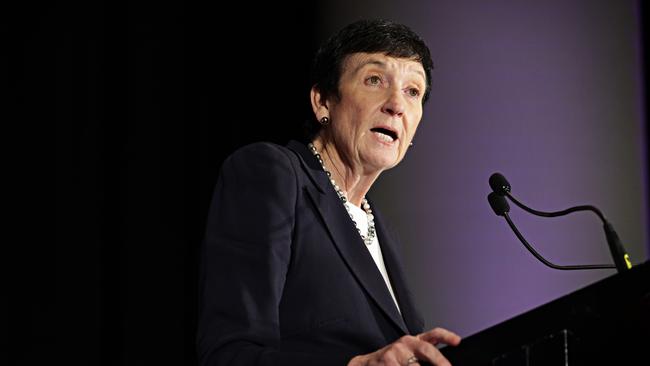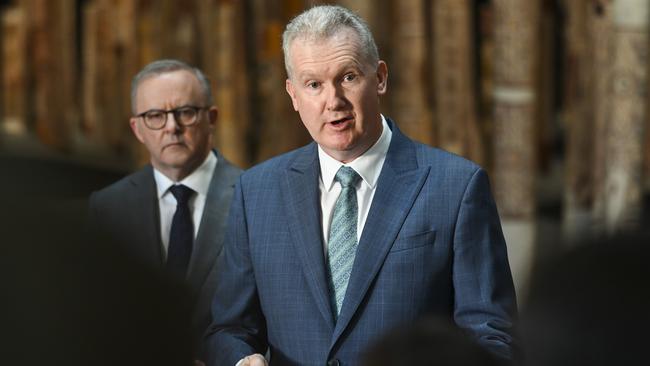Builders and business chiefs pushback against IR laws
The campaign against Anthony Albanese’s IR reforms widens, with new polling showing Australians are more concerned about cost-of-living and the economy.

Construction and business chiefs have broadened their campaign against Anthony Albanese’s industrial relations reforms, with new polling revealing cost of living, the economy and taxes dominate voter concerns ahead of IR.
Master Builders Australia, which was excluded from Workplace Relations Minister Tony Burke’s union-employer meeting last week, has released polling claiming more than half of voters believe proposed “employee-like” industrial relations changes will drive up costs and red tape.
The survey of more than 1300 Australians last month, including samples from key marginal Labor seats, found 45 per cent of voters rated cost of living as their primary concern, followed by the economy and taxes (23 per cent), climate change (9 per cent) and health (9 per cent). Across top-of-mind issues, IR scored 4 per cent with the majority of voters concerned about wages.
The Insightfully research said while 64 per cent of voters knew about the Albanese government’s IR reforms, awareness of the specific detail was “weak”. “Australian voters agree (56 per cent) that the government’s ‘employee-like’ industrial reforms will increase costs and red tape for small businesses who use independent contractors,” the polling report said.
As MBA launches its campaign against employee-like changes, which will be backed by other industry groups in coming weeks, Business Council of Australia chief executive Jennifer Westacott attacked proposed same job, same pay labour hire reforms.
The government, yet to release draft legislation, has pushed back against employer groups for broadening the nature of proposed IR reforms beyond their intended scope. Mr Burke has described an industry-wide campaign against same job, same pay as “plain loopy”.

Writing in The Australian, Ms Westacott said if flatlining productivity isn’t improved “our wages will be lower, our enviable low unemployment will be at risk, goods will be more expensive and interest rates will be higher for longer”.
The BCA chief said Australia must embrace a workplace relations system that “gives us the tools to tackle the nation’s productivity challenges head-on while empowering and protecting workers”.
“The government’s proposed radical industrial relations shake-up threatens to work against this. The extent of the government’s same job, same pay proposals remain unclear and labour hire is not yet defined,” Ms Westacott wrote.
Ms Westacott agreed “no one should be ripped off” if labour hire is used to undercut wages but said the policy would “kill flexibility in the economy by not allowing people to put on extra staff when it’s busy or when a big project is under way”. “Same job, same pay is nothing to do with enforcing the law. An employer will be discouraged for rewarding people for being more productive.”
After last week’s meeting in Sydney, The Australian revealed the government was considering a new test to prevent specialist contractors being caught up by same job, same pay changes.
MBA chief executive Denita Wawn, excluded from last Friday’s meeting after Mr Burke accused her of being “incapable of working within the consultation processes of the previous government, let alone ours”, said employee-like changes go beyond the government’s “purported original scope of supporting gig workers”.
Ahead of the 2022 election, Labor said it would give the Fair Work Commission new powers to “set minimum standards for workers in ‘employee-like’ forms of work, including the gig economy”.
Ms Wawn said the government has “failed to ease the concerns of the 440,000 businesses in the building and construction industry; 98 per cent of them being a small business”.
“The dynamic nature and array of specialist contractors required on a project mean it is simply not feasible for businesses to have to permanently employ independent contractors. Independent contractors and subbies have worked hard to establish their businesses, build strong relationships, and enjoy the freedom to choose how they operate,” Ms Wawn said.








To join the conversation, please log in. Don't have an account? Register
Join the conversation, you are commenting as Logout